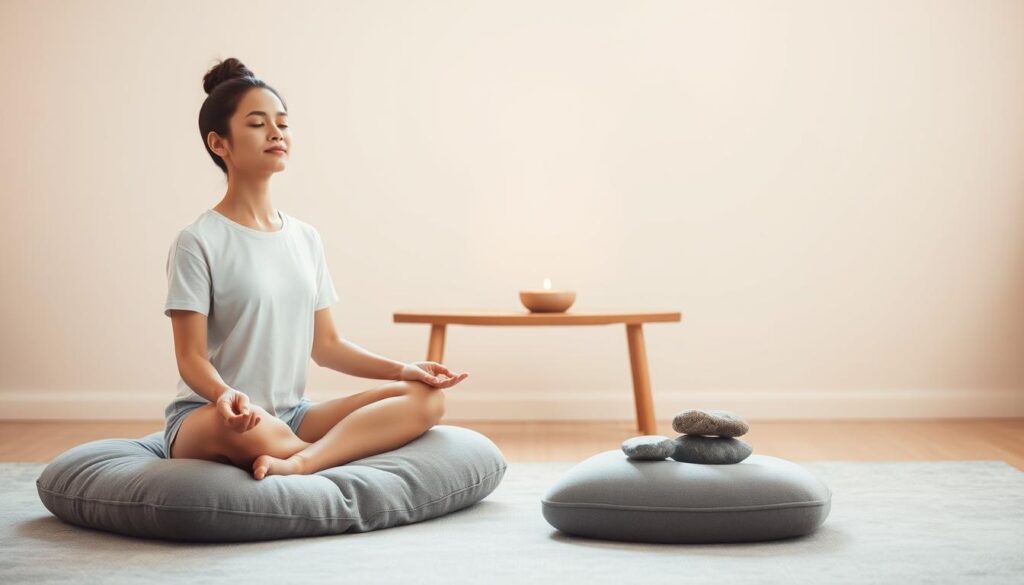Technology has changed how we handle our mental health, giving us meditation and mindfulness apps. These apps provide guided sessions to help with relaxation and lowering stress. They make practicing mindfulness easy, fitting smoothly into our daily lives.

Relaxing Sleep App
With custom training plans and a supportive community, there’s an app for anyone looking to improve their well-being.
Anúncios
Introduction to Meditation and Mindfulness
Meditation and mindfulness are key for better mental health and wellness. They come from old traditions but are now loved for easing stress and enhancing emotional well-being. People learn different methods through meditation to be more aware, focused, and calm. This practice changes how we feel emotionally in big ways.
Mindfulness makes people stay in the present moment with full attention. By focusing on breath and meditation, one learns to manage thoughts and lessen stress. With today’s busy life, more folks use meditation and mindfulness apps. They find these tools easy to fold into their daily lives.
Anúncios

Understanding the Benefits of Meditation
Meditation brings many positive changes to mind and emotions. It’s great for reducing stress and making mental health better. By meditating regularly, people become more peaceful. This helps them deal with tough situations better.
Stress Reduction and Relaxation
Studies show that meditation cuts down on stress a lot. It teaches people how to relax and handle stress better. With meditation apps, people learn good breathing methods. These methods help them feel calm quickly and improve mental health over time.
Enhanced Focus and Concentration
Meditation does more than ease stress – it also makes focus better. The practices help clear the mind and keep people in the now. So, they get better at paying attention and making choices. This boosts their mental wellness even more.
Criteria for Selecting the Best Meditation and Mindfulness App
Choosing the right meditation and mindfulness app involves several key points. It must be easy to use, especially for beginners. The design and how easy it is to get around the app play big roles. They help you relax and become more mindful.
User Interface and Navigation
An app needs to be simple and direct to please its users. Easy navigation helps people find what they need quickly. With organized sections and a nice look, more people will want to use the app often.
Variety of Meditation Programs
An app should offer many meditation options to fit your style and goals. Whether it’s for stress, focus, or sleep, there should be something for everyone. A good app makes finding these options easy.
Pricing Structure and Accessibility
The cost of meditation apps is important. Some apps let you try features for free or offer basic options without charge. Others may ask for a subscription fee for premium content. Pick an app that fits your budget and still offers what you need for your mindfulness path.
Top Free Meditation and Mindfulness Apps
Various free meditation apps help you bring mindfulness into your daily routine. They come with features that stand out. These apps let you learn at your own speed. You can find guided content that fits what you need.
Insight Timer: A User-Friendly Experience
Insight Timer is at the top when it comes to free meditation apps. It boasts more than 150,000 guided meditations. Users of all levels find it useful for reducing stress, sleeping better, and staying mindful. It also has a timer you can customize and peaceful sleep music.
Medito: Non-Profit Approach to Mindfulness
Medito is unique because it’s a free app that isn’t after profit. This means everyone can access its meditation tools without paying. It has an easy-to-use design. This makes it popular among people looking for help with mindfulness.
Blackfullness: Focus on Inclusivity
Blackfullness champions meditation and mindfulness with an eye on inclusivity. It’s a free app welcoming people from all walks of life. The app aims to make mindfulness feel welcoming for everyone. It offers content that speaks to a variety of communities.
Best Paid Meditation and Mindfulness Apps
Several paid meditation apps provide deep mindfulness experiences with their unique features. They offer curated content and expert guidance for all meditators. Here are three top options in the paid meditation app market.
Aura: Comprehensive Library and Coaching
Aura is a leading paid meditation app with over 10,000 meditations. It offers a personalized experience with coaching. An annual subscription is about $70, appealing to many. Yet, some users report technical issues occasionally.
Headspace: Science-Backed Techniques
Headspace is known for its science-based methods and engaging content. It’s easy to use, even for beginners, and has exercises for stress, emotional health, and focus. A monthly subscription gives users access to all premium features for a comprehensive experience.
Calm: Focused on Sleep and Relaxation
Calm is perfect for those seeking better sleep and relaxation. It features sleeping aids like soundscapes and stories, plus mindfulness practices. With an affordable price, Calm suits new and experienced meditators wanting more peace.
Meditation and Mindfulness App Features to Look For
Looking for the right meditation app means checking for key features. Important ones are guided meditations and effective breathing exercises. They help you learn meditation while relaxing and focusing better.
Guided Meditations and Breathing Techniques
Guided meditations are great for everyone, whether you’re just starting or have practiced for years. A guide’s voice leads you through different methods to help you stay mindful. Breathing exercises teach you to control your breath, helping you find peace. These features together can make your meditation practice much more enjoyable.
Community Support and Social Features
Community support makes your meditation journey more rewarding by connecting you with others. Many apps include social features for sharing your journey and advice. This encourages a feeling of community and can keep you motivated. Having both community support and guided practices makes a complete platform for growth.
New and Innovative Meditation Apps
In the world of meditation, many new apps have popped up. They aim to make meditation more fun and helpful, using the latest tech. People from all walks of life might find these new options valuable for their mental health and staying productive.
Brain.fm: AI-Generated Focus Music
Brain.fm is not your usual meditation app. It uses AI to create music that helps you focus better. The tunes are based on science to help change your brain’s state. This makes it easier for you to concentrate and clears your mind.
Smiling Mind: Designed for Children
Smiling Mind focuses on helping kids understand the value of mental health early on. It has special activities for kids and teens to help them handle their emotions better. The app makes learning about mental health fun, helping them grow into adults who can cope well.
How Meditation Apps Can Fit into Your Daily Routine
In our busy world, taking care of yourself is tough. Meditation apps help by fitting meditation into any schedule. They have many tools to help anyone start being more mindful easily.
Short Meditations for Busy Schedules
Meditation apps offer quick sessions. These last only a few minutes, ideal for the busy person. You can pick short, guided meditations that help clear your mind and make you more productive.
Here are ways to add these brief meditations into your day:
- Start the day with a one-minute breathing exercise to set a positive tone.
- Take a brief break during work to recharge with a three-minute mindfulness practice.
- Use lunch breaks to engage in short meditations that enhance focus for the afternoon.
- Wind down with a five-minute session before bed to promote relaxation.
Adding short meditations to your daily routine can really help your mental health. These quick moments of mindfulness can make a big difference, even if you’re too busy for a long session.
Feedback from Users
Testimonials from users highlight how meditation apps change lives. They talk about their personal experiences. These stories reveal better mental health from using these apps. Users say they feel less anxious, more focused, and calmer overall.
Success Stories and Testimonials
Stories from real people show the difference meditation makes. They moved from stress to peace and mindfulness. Highlights include:
- A busy professional who found resilience through daily meditation practices, enhancing work performance.
- A parent who integrated short meditation sessions into her day, leading to a more positive family atmosphere.
- A student who improved concentration and academic performance by using guided sessions tailored for focus.
These stories show us meditation apps really help. They inspire others to try meditation in their daily life.
Best Practices for Using Meditation and Mindfulness Apps
Using meditation and mindfulness apps the right way can make your experience better. It’s important to set goals that are realistic to help ensure you succeed. Starting with short sessions and then making them more complex is helpful as you get more comfortable.
Setting Realistic Goals
Setting achievable goals in meditation boosts confidence and helps maintain a regular practice. Here are a few tips for goal-setting:
- Start small by aiming for just five minutes a day.
- Gradually increase the duration of your sessions.
- Choose a specific focus, such as breath awareness or guided imagery.
- Track your progress to stay motivated.
Creating a Consistent Practice
Making meditation a regular habit is key for long-term benefits. To build a steady routine, consider these strategies:
- Set a fixed time each day for your meditation session.
- Use reminders from your app to encourage regular engagement.
- Incorporate meditation into existing routines, like morning coffee or evening wind-down.
- Experiment with different app features to find what resonates with you.
Conclusion
Meditation and mindfulness apps are a big help in today’s busy world. They offer many choices, from free to paid, to fit everyone’s needs. These apps are great for relaxing and getting rid of stress, which makes us mentally stronger.
Adding mindfulness to our daily life helps us stay calm and focused. This way, we can keep our balance in a hectic world. Meditation apps are key in building a mindful and mentally healthy community.
To sum up, using these apps can lead to a happier mind. They have something for everyone, like guided sessions or breathing exercises. By mixing these practices with our daily tasks, we grow and live better lives.



